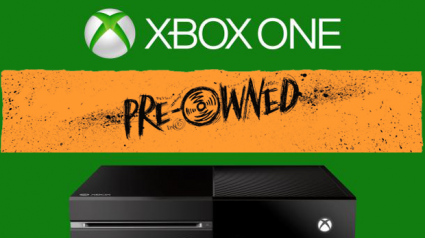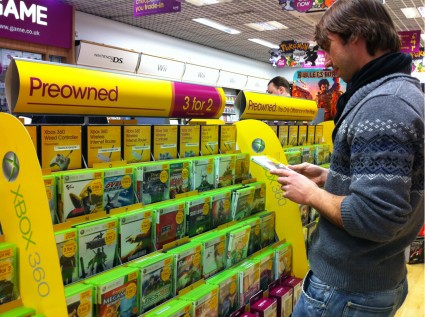Editorials
Will Microsoft and Publishers Take A Percentage Cut Of Every Pre-Owned Sale?
May 26, 2013, Author: Neil Hughes
Remember the good old days when a company could plan a meticulous marketing plan? Where information was slowly drip fed to the masses to leave people wanting more, with a long list of unanswered questions that were fobbed off with a “you will just have to wait” response?
In this digital age of instant gratification we now expect our news straight-talking and honest, and have very little patience with anyone that tries to play mind games. Even the smallest mistakes or sidestepped questions are quickly magnified and spread around the world in minutes, which can ruin even the most cleverly orchestrated strategic plan before you can say the words “pre-owned games”.
If Sony were feeling on the ropes and wondering if their choice to announce their new console first was a bad idea as Microsoft stepped forward into the spotlight a few days ago, they must be rubbing their hands with glee as the first round came to an end.
After the Microsoft announcement, people were only talking about four things. These were the over-the-top focus on TV, the lack of in-game footage, the always-online requirement and the deal-breaking leak in an interview with Wired magazine that seemed to suggest that gamers would need to pay a fee to play a pre-owned game on their console.
Most of these concerns will be forgotten by the time E3 comes around. The pre-owned games fees could be enough to damage the release of the Xbox One, however, as frugal gamers consider the prospect of paying £400 for a console and £50 for a game with little hope of sharing games with friends and siblings, or being able to use a rental service.

Microsoft’s headache that won’t go away.
After much backtracking from Microsoft, Major Nelson was forced to make a cryptic statement saying:
“Over the past few days, we have been reading comments and message boards following the Xbox One announcement. There are a few questions regarding used games. I wanted to clarify and provide this official statement:
The ability to trade in and resell games is important to gamers and to Xbox. Xbox One is designed to support the trade in and resale of games. Reports about our policies for trade in and resale are inaccurate and incomplete. We will disclose more information in the near future.”
Despite this somewhat vague response, anonymous retail sources have advised MCV that Microsoft “briefed key retail partners on how it intends to take ownership of the pre-owned market.”
The MCV website explains how the system would potentially work.
“A gamer walks into a retailer and hands over the game they wish to sell. This will only be possible at retailers who have agreed to Microsoft’s T&Cs and more importantly integrated Microsoft’s cloud-based Azure pre-owned system into its own.
The game is then registered as having been traded-in on Microsoft’s system. The consumer who handed it over will subsequently see the game wiped from their account – hence the until now ambiguous claim from Phil Harrison that the Xbox One would have to ‘check in’ to Microsoft’s servers every 24 hours.”

Pre-owned games at premium prices?
The retailer can then sell the pre-owned game at whatever price they like, although as part of the system the publisher of the title in question will automatically receive a percentage cut of the sale. As will Microsoft. The retailer will pocket the rest.”
The big gaming websites are all starting to reach out to Microsoft for an official response to the worrying stories that are showing no signs of going away. If anything, this is growing into a massive concern considering their traditional stance on the cash cow known as the licensing model.
This in turn has caused further speculation. Console Deals has quoted some figures from their source, which are that “Access will be roughly 10% less than the game would be brand new. So for a £40 launch the access would still be £35 (that’s total price, not additional). Access to a budget game would obviously be less”. This prompts even more questions about the future of gaming on the high street and gaming rental services from companies such as LoveFilm. Would anyone actually spend £35 on a pre-owned game?
What about indie stores that do not have the Azure system installed? What about the freedom to sell your own games on eBay or Amazon Marketplace? There are so many people that could be affected by this potential change and I cannot help but think the current silence will lead to rapid back-peddling in the next few months.
The next generation of consoles is expecting to give the gaming industry a much-needed boost, but the recent announcements appear to be predicting the downfall of many of the aspects of gaming that we currently take for granted.
We will probably have to wait until E3 for the truth which may or may not put all of our minds at ease, but in 2013, if your company or product is receiving negative attention across the internet, you have to act quickly with an open and honest response or face the wrath of your customers.
Cryptic or vague statements just don’t cut it anymore in this Information Age, and you would think that Microsoft of all companies would embrace this change in culture. Yet after neglecting to react to the always on-line debacle it appears that although the shiny new console is the future, certain attitudes belong firmly in the past.
If there is an ounce of truth in any of these stories, would it change your opinion on Microsoft’s new console?
Tagged Microsoft, Pre-Owned Games, Xbox One


